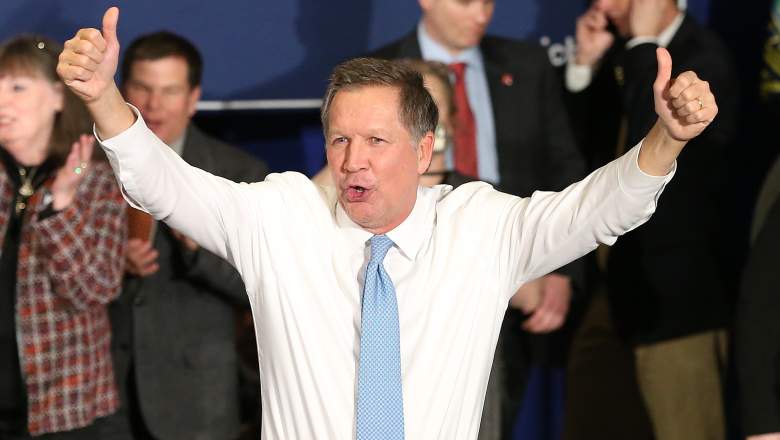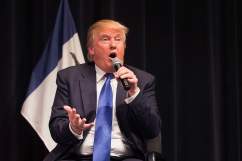
John Kasich gained some momentum after his second-place finish in New Hampshire, but he has a narrow path to the nomination. (Getty)
A GOP primary field that once included a whopping 17 candidates has gotten a lot smaller over the past six months. But as the campaign heads to South Carolina, seven candidates are still in the race — more than triple the number of candidates on the Democratic side.
Here’s a look at who’s still in the field and who isn’t:
Who’s Still in & Who's Out of the GOP Field
| STILL IN | DROPPED OUT |
| Donald Trump | Rick Perry |
| Ted Cruz | Scott Walker |
| Marco Rubio | Bobby Jindal |
| Jeb Bush | Lindsey Graham |
| John Kasich | George Pataki |
| Ben Carson | Mike Huckabee |
| Jim Gilmore | Rick Santorum |
| Rand Paul | |
| Chris Christie | |
| Carly Fiorina |
Which Candidates Will Drop Out Next?
Five of the 17 candidates — Rick Perry, Scott Walker, Bobby Jindal, Lindsey Graham and George Pataki — dropped out of the race before a single vote was cast.
Three others — Mike Huckabee, Rick Santorum and Rand Paul — dropped out after the February 1 Iowa caucus, but before the February 9 New Hampshire primary.
Two others — Chris Christie and Carly Fiorina – dropped out after New Hampshire. So who could be next?
The South Carolina primary is set for Saturday, February 20. The Nevada caucus is next up on the GOP calendar, scheduled for February 23. Donald Trump, Ted Cruz and Marco Rubio are all very likely to stay in the race beyond South Carolina. Jim Gilmore is a bit of a wildcard. He has no chance whatsoever to win the nomination, having received less than 1 percent of the vote in both Iowa and New Hampshire. But those poor performances have yet to push him out of the race. It’s conceivable he’ll stay in the race for a long time, even if his presence in the race has no impact at all on other candidates.
Here’s a breakdown of the other candidates.
John Kasich: The Ohio governor finished second in New Hampshire, giving his campaign some reason to move on to South Carolina. But he’s polling no better than fifth place in South Carolina, and it’s hard to imagine a path forward if he doesn’t exceed expectations.
Ben Carson: It’s been clear for a while now that Carson has very little shot at winning the nomination. He came in fourth place in Iowa, a state dominated by the type of social conservative voters who have made up the bulk of Carson’s supporters. He then came in eighth place in New Hampshire and would need to exceed expectations in South Carolina just to replicate his finish in Iowa. He’s vowed to stay in the race so as not to disappoint the people who drafted him to run, and gone so far as to say that he can win South Carolina. But a growing chorus of conservatives has been questioning his motives for staying in, arguing that Carson is presiding over a #scampagin whose purpose is for consultants to milk supporters for donations. It’s not clear what Carson’s end game is, and that makes it increasingly hard to predict what he’ll do.
Jeb Bush: The former Florida governor’s campaign has gotten less bang for its buck than any campaign in history, spending more than $100 million in advertising just to get a combined 14 percent of the vote in Iowa or New Hampshire. His fourth-place finish in New Hampshire — he narrowly edged Rubio — has apparently convinced him that he has a chance in South Carolina, where his brother, former President George W. Bush, will join him on the campaign trail. Bush has the financial resources he’d need to compete for the long haul. But if he doesn’t at least finish ahead of Rubio in South Carolina, his chances at winning the nomination will go from slim to just about nonexistent.
